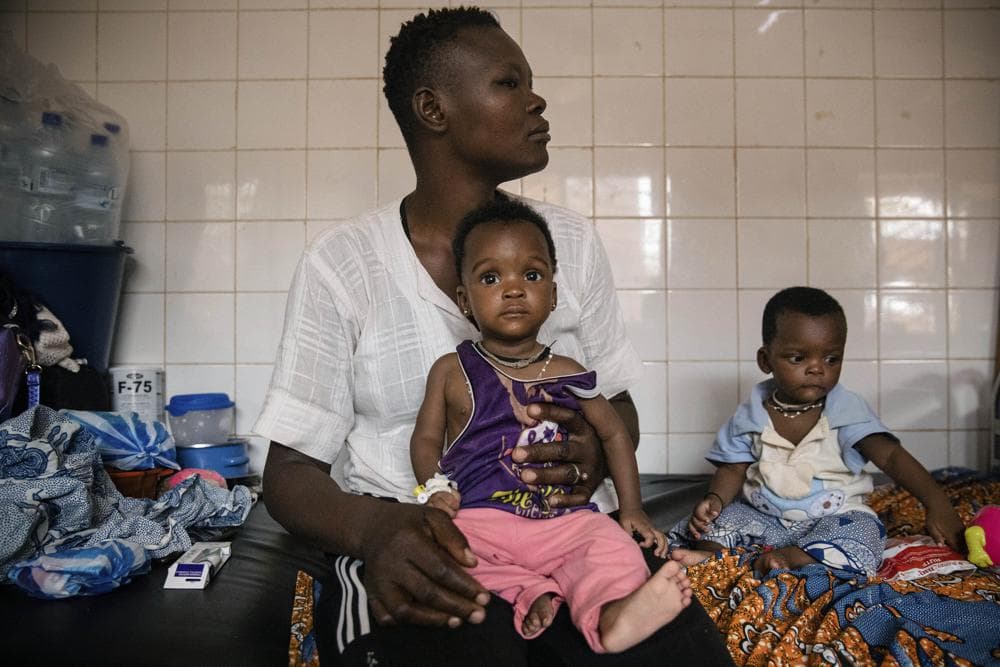NEW YORK – Bishop Alfred Aygenta of Navrongo-Bolgatanga, Ghana, remembers a visit to refugee camp on a cooler day this past December where he saw women with small children, many of whom had fallen ill with coughs and colds, absent a place to lay their heads to sleep.
The plight of the people Aygneta saw that day, and millions of others across the Sahel region, are the reason 10 faith leaders from West Africa are in the U.S. this week. Aygenta and other leaders say international assistance is needed to address the region’s deteriorating humanitarian and security situation.
The faith leaders made their case to the State Department on March 21, and on March 22 to the Senate and House Committee on Foreign Relations. Their visit follows the U.S. Secretary of State Anthony Blinken’s trip to the region, where he announced $150 million in direct assistance.
Beyond a request for aid, Aygneta said the faith leader’s trip to the United States is important to bring attention to what he calls a “silent catastrophe” in the region.
“We need to give a voice to our brothers and sisters in the Sahel who have been going through this for several years, and it seems nobody is paying attention,” Aygenta told Crux. “That’s the reason we felt we needed to bring attention to the world, and especially the U.S. government.”
He added that they want to express the desire for collaboration with the government.
“We know governments cannot do everything, and that’s why we wanted to come together to encourage governments to work with us as local leaders so we can reach the people,” Aygenta explained. “We want governments to be aware that we are partners not competitors.”
The Sahel is the region of Africa located just below the Sahara Desert in Africa. It includes Niger, Ghana, Côte d’Ivoire, Burkina Faso, Mali, Chad and Sudan. It’s a region where violent extremists, such as the Islamic State, local self-defense groups and gangs are increasingly terrorizing civilians through attacks, kidnappings and the imposition of unlivable conditions.
Primarily because of that violence, the number of displaced people in the region increased from 2021 to 2022 by 40 percent to 2.4 million, with women and children composing more than half of those displaced, according to data from Catholic Relief Services, the U.S. Bishops international humanitarian arm.
“[The extremists] are not people who civilians can stand up to so they flee,” Sheikh Dr. Hazic Hussein Zakaria from Ghana told Crux. “So how do we help these people who are fleeing disaster? How do we make sure they are secure? How do we make sure they have food to eat and they are healthy?”
Patrick Williams, the CRS regional program manager for the Sahel Peace Initiative, highlighted that people in the region are living “in a constant state of terror.”
“It is a slow burning crisis in which community leaders are systematically kidnapped or assassinated, schools are closed, and civilians are killed without warning,” he said.
CRS coordinated the West Africa faith leader’s visit to the United States. Including Aygenta and Zakaria, 10 made the trip. They include: Sheikh Barham Aboubacar from Niger, Archbishop Laurent Lompo of Niamey, Niger, Khalilou Abdoulaye Camara, Chargé de Mission at the Ministry of Religious Affairs in Mali, Bishop Laurent Dabire of Duri, Burkina Faso, Auxiliary Bishop Yiki Alexandre Bazie of Koudougou, Burkina Faso, and Bishop Essoh Burno Yedoh of Bondoukou, Côte d’Ivoire.
In terms of support, multiple of the faith leaders told Crux that the U.S. government can help provide material support like food and medicine. But also with humanitarian projects that can help provide health services, education, and hygiene and sanitation infrastructure to help the “host communities overstretched by the number of refugees coming across the borders.”
The faith leaders also emphasized the impact the situation is having on young people in the region with schools closed. Aygenta said it’s important for the international community to help address the root causes of the situation, as well, and to equip young people with the skills, training, and opportunities so they are not recruited by, or turn to, the extremist groups.
“Youth are very fragile, very sensitive, and if they don’t have economic opportunities, jobs, they can be vulnerable to groups, so this is why it’s very important for them to support youth,” Lompo added.
Zakaria noted that’s part of the reason it’s so important for leaders of different faiths to come together.
“If we step up education on interfaith dialogue as we are doing at the moment, everybody becomes suspicious of anybody they can not properly identify,” Zakaria explained. “So we can get the young people to understand that yes, some people come in the name of Islam, but they are coming to deprive you of your rights, they’re coming to enslave you, and that indication from religious leaders will help the youth to become resilient and resistant to influences of the violent extremists.”
On the topic of interfaith dialogue, Zakaria said it’s crucial that leaders of different faiths in West Africa have come together because “no single religion can deal with a situation standing on its own.”
“We all know that the violent extremists, most of them go to communities in the name of religion, especially Islam, and we believe they are using religion as a scapegoat to cause mayhem in our societies,” Zakaria said. “Religion should be the right tool to be used to counter what they are doing, so that is why we have found it is prudent to get the religious leaders together to work in concert.”
Follow John Lavenburg on Twitter: @johnlavenburg














